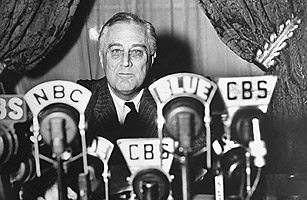
Pres. Franklin D. Roosevelt making a Fireside Chat speech on radio during WWII.
Populist impulses — emotional demands for systemic change, waged in the name of the common man, demonizing Washington or Wall Street elites — are always rattling our politics. It's a tendency with roots in Andrew Jackson's swaggering mass-democratic appeals and attacks on the Bank of the United States; it crested with the currency-obsessed, debt-strapped farmers of the late 19th Century People's Party. Its standard-bearers today occupy no clear ideological home — self-styled leaders of recent vintage range from Jim Webb to Arnold Schwarzenegger to Pat Buchanan.
For decades, liberals and conservatives have championed dueling populisms: the left beating the drum for economic fairness, the right targeting the power of the federal bureaucracy and the cultural elite. The surge of populism induced by last fall's economic collapse, though, looks closer to that of the 1930s, when anti-government, anti-finance, anti-elite sentiment burst the boundaries of party and region.
During the Depression, citizens of all stripes joined in an inchoate but potent critique of society — raising fears that capitalism and democracy might be moribund. Even Franklin Delano Roosevelt was worried. Elected overwhelmingly in 1932 on the strength of the public discontent, FDR found himself jarred into action by recurring waves of dissent. Like Roosevelt after his triumphant hundred days, Barack Obama seems for now to have tamed the populist outbursts of his early presidential days. But like FDR, he also must remain vigilant, lest he find himself on the receiving end of the demand for change.
Roosevelt's challenge wasn't the number of populists unreconciled to his leadership but their intensity and variety. He had to act boldly and effectively enough to satisfy the outrage. Yet he also had to establish himself as the cooler alternative to demagogues who often generated among the populace as much fear as hope.
The most troublesome nemesis was the ruthless Huey Long of Louisiana, since immortalized as Willie Stark by Robert Penn Warren in All the King's Men. With his wild curly hair, fleshy face, garish dress, and constant sense of motion, Long looked very much the rabble-rouser — though he also had a record of hard achievement that gave him credibility with the dispossessed. Having helped Roosevelt secure the Democratic presidential nomination in 1932, Long soon raised the opposition banner. In 1934 he took to the airwaves to tout his "Share Our Wealth" plan-a naive, untheoretical plan to radically redistribute wealth and income, presented in terms as accessible as they were unworkable. "Share Our Wealth" Clubs sprang up around the country, demanding sweeping change.
A critic of capitalism who also hated communism, a demagogue and authoritarian, Long defied classification as left or right. So did Father Charles Coughlin, the so-called Radio Priest, who denounced wicked financiers as the cause of the Depression on his top-rated weekly broadcast, calling for currency inflation as a panacea. Coughlin's outre, moralistic speeches, heard by up to 40 million listeners, generated tens of thousands of letters a week, many tendering donations. He too moved from support to rebuke of Roosevelt, causing worry in the White House, although he eventually alienated himself with an increasingly fervid anti-Communism, doctrinaire Catholicism, and anti-Semitism. The fascist label became increasingly apt.
Many more "voices of protest," as the historian Alan Brinkley has termed them, emerged, some offering totalizing visions, others preferring quick-fix policy solutions, radical critiques, or eccentric alternatives to the New Deal. The Communist party quadrupled its ranks in Depression's first years, claiming a disproportionate slice of the intelligentsia and the labor movement. In 1932, its presidential ticket drew support from a constellation of great minds, from the novelist Theodore Dreiser to the critic Edmund Wilson. The novelist Upton Sinclair ran for California governor in 1934 on a platform called End Poverty in California (EPIC), calling on the state to seize unused factories and farmland to house and employ the destitute. Francis Townsend, a 67-year-old Long Beach physician, won fame with a plan to give all Americans over 60 a monthly stipend of $150, funded by a national sales tax. Pension advocates later rallied behind a kindred scheme called "Ham and Eggs," which made its way onto the state ballot as a popular initiative.
For all their demagoguery and for all the dangers they posed, these sundry movements were helpful in keeping Roosevelt's feet to the fire. "I am fighting communism, Huey Longism, Coughlinism, Townsendism," the president despaired at one point. To his aide Raymond Moley he vowed to "steal Long's thunder."
He did. In 1935 he passed his own Revenue Act — shamelessly dubbed the "soak the rich" tax — on gifts, estates, and corporate and investment income, demonstrating his egalitarian commitments. Prodded by the Townsend plan and old-age pension agitation, he engineered the passage of the Social Security Act, providing an income floor for the elderly as well as the unemployed, the widowed and the orphaned.
Into 1936, Roosevelt famously denounced, in his address to the Democratic convention, the "economic royalists." Some of his phrases in that speech — "Those who tilled the soil no longer reaped the rewards which were their right"; "Individual initiative was crushed in the cogs of a great machine" — came straight from the People's Party phrasebook. Not for nothing did FDR's policies of 1935, often called the "Second New Deal," earn a reputation as more radical than the first.